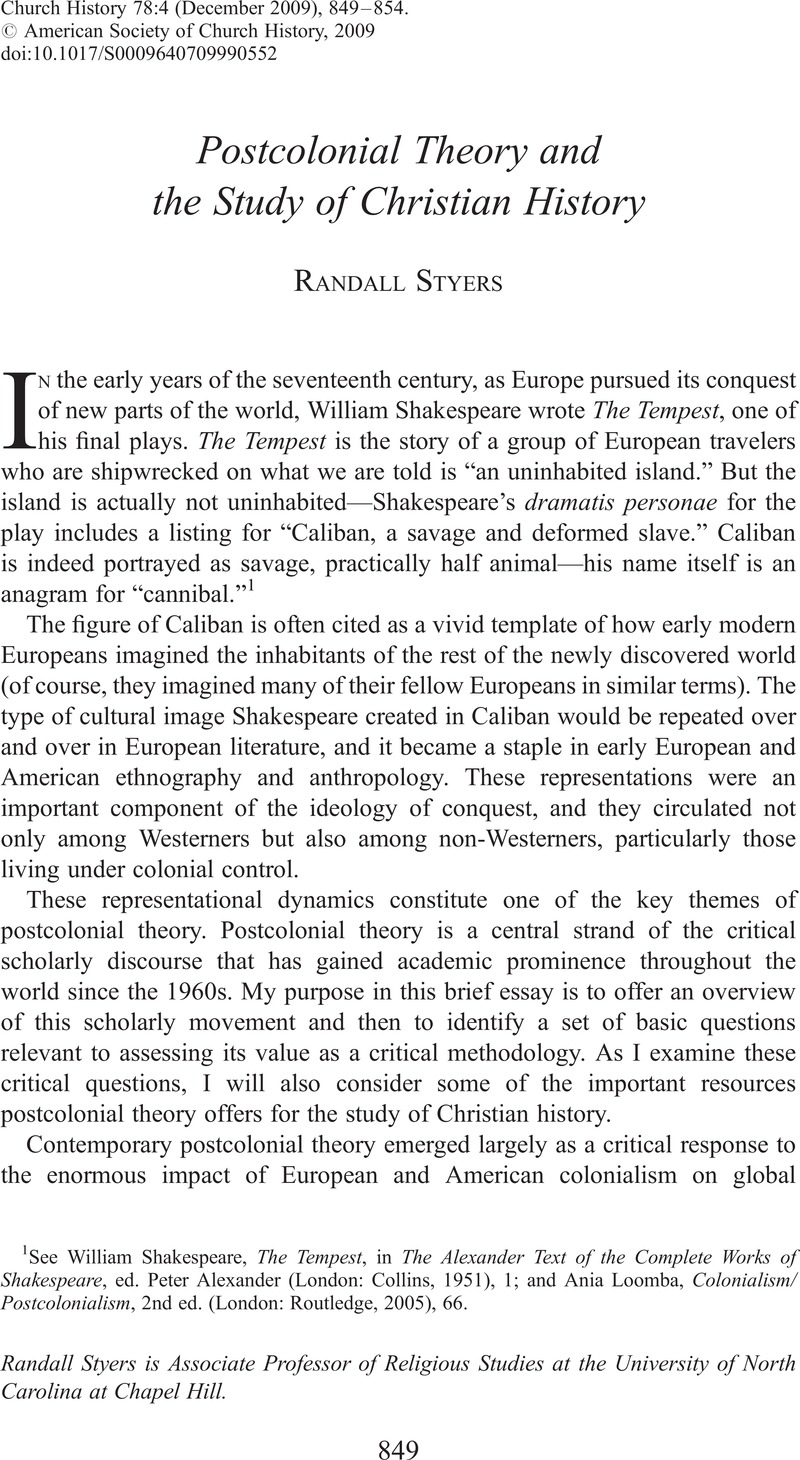Article contents
Postcolonial Theory and the Study of Christian History
Published online by Cambridge University Press: 27 November 2009
Abstract

- Type
- Forum
- Information
- Copyright
- Copyright © American Society of Church History 2009
References
1 See Shakespeare, William, The Tempest, in The Alexander Text of the Complete Works of Shakespeare, ed. Alexander, Peter (London: Collins, 1951), 1Google Scholar; and Loomba, Ania, Colonialism/Postcolonialism, 2nd ed. (London: Routledge, 2005), 66Google Scholar.
2 Said, Edward, Culture and Imperialism (New York: Vintage, 1994), 8Google Scholar; and Betts, Raymond F., Europe Overseas: Phases of Imperialism (New York: Basic Books, 1968), 21–35, 46–60Google Scholar.
3 Lenin, V. I., Imperialism, the Highest Stage of Capitalism (New York: International Publishers, 1939 [1916]), 76 (emphasis in original)Google Scholar.
4 See Young, Robert J. C., Postcolonialism: An Historical Introduction (Oxford: Blackwell, 2001), 2–3Google Scholar; and Césaire, Aimé, Discourse on Colonialism, intro. Robin D. G. Kelley, trans. Pinkham, Joan (New York: Monthly Review Press, 2000 [1950])Google Scholar.
5 See Young, Postcolonialism.
6 See Césaire, Discourse on Colonialism; Fanon, Franz, Black Skin, White Masks, trans. Philcox, Richard (New York: Grove Press, 2008 [1952])Google Scholar; Castro, Fidel, History Will Absolve Me (New York: L. Stuart, 1961 [1953])Google Scholar; Sauvy, Alfred, “Trois mondes, une planète,” L'Observateur politique, économique et littéraire 118 (August 14, 1952): 14Google Scholar; and Young, Postcolonialism, 161–81.
7 Achebe, Chinua, Things Fall Apart (New York: Anchor Books, 1994 [1958])Google Scholar.
8 Fanon, Franz, The Wretched of the Earth, intro. Jean-Paul Satre and Homi K. Bhaba, trans. Philcox, Richard (New York: Grove Press, 2004 [1961])Google Scholar.
9 Said, Edward W., Orientalism (New York: Pantheon Books, 1978)Google Scholar.
10 See, for example, the essays collected in Williams, Patrick and Chrisman, Laura, eds., Colonial Discourse and Post-Colonial Theory: A Reader (New York: Columbia University Press, 1994)Google Scholar; Chambers, Iain and Curti, Lidia, eds., The Post-Colonial Question: Common Skies, Divided Horizons (London: Routledge, 1996)CrossRefGoogle Scholar; and Mongia, Padmini, ed., Contemporary Postcolonial Theory: A Reader (London: Arnold, 1996)Google Scholar.
11 Among the many important recent texts utilizing postcolonial methods in the study of religion, see Asad, Talal, Genealogies of Religion: Discipline and Reasons of Power in Christianity and Islam (Baltimore: Johns Hopkins University Press, 1993)Google Scholar; Chidester, David, Savage Systems: Colonialism and Comparative Religion in Southern Africa (Charlottesville: University of Virginia Press, 1996)Google Scholar; McCutcheon, Russell T., Manufacturing Religion: The Discourse of Sui Generis Religion and the Politics of Nostalgia (New York: Oxford University Press, 1997)Google Scholar; King, Richard, Orientalism and Religion: Postcolonial Theory, India and ‘The Mystic East’ (London: Routledge, 1999)Google Scholar; Fitzgerald, Timothy, The Ideology of Religious Studies (New York: Oxford University Press, 2000)Google Scholar; van der Veer, Peter, Imperial Encounters: Religion and Modernity in India and Britain (Princeton, N.J.: Princeton University Press, 2001)Google Scholar; Peterson, Derek R. and Walhof, Darren R., The Invention of Religion: Rethinking Belief in Politics and History (New Brunswick, N.J.: Rutgers University Press, 2002)Google Scholar; and Masuzawa, Tomoko, The Invention of World Religions, Or, How European Universalism Was Preserved in the Language of Pluralism (Chicago: University of Chicago Press, 2005)CrossRefGoogle Scholar.
12 During, Simon, “Postmodernism or Postcolonialism Today?” Landfall 39 (1985): 366–81Google Scholar.
13 For broad scholarly reflection on the nature of this term, see Young, Postcolonialism, 15–69; and Loomba, Colonialism/Postcolonialism.
14 Aijaz Ahmad, “The Politics of Literary Postcoloniality,” in Contemporary Postcolonial Theory: A Reader, ed. Mongia, 283, citing Arif Dirlik, “The Postcolonial Aura: Third World Criticism in the Age of Global Capitalism,” in Contemporary Postcolonial Theory: A Reader, ed. Mongia, 294–320.
15 See, for example, Juan, E. San Jr., Beyond Postcolonial Theory (New York: St. Martin's Press, 1999)Google Scholar; and Dirlik, “The Postcolonial Aura.”
16 See Loomba, Colonialism/Postcolonialism, 29.
17 Ibid., 84.
18 See in this regard Clark, Elizabeth A., History, Theory, Text: Historians and the Linguistic Turn (Cambridge, Mass.: Harvard University Press, 2004)Google Scholar.
19 Memmi, Albert, The Colonizer and the Colonized (New York: Orion Press, 1965 [1957]), 91Google Scholar.
- 1
- Cited by




